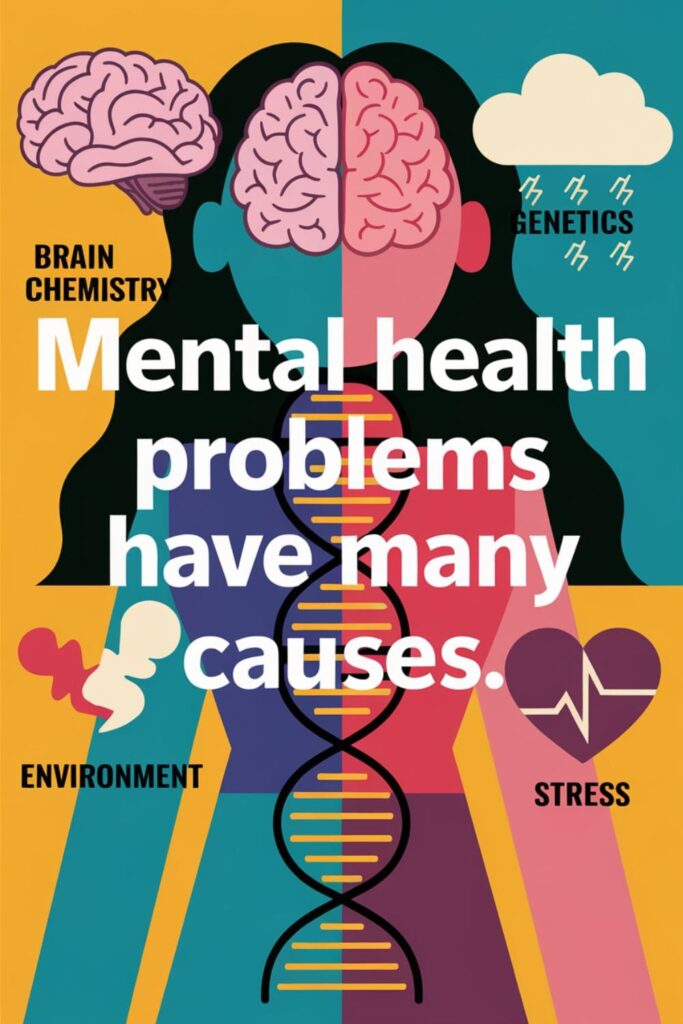Mental health misconceptions have persisted throughout history, often making it harder for people to seek help or understand their own experiences. Today, we’re checking into some of the most common myths about mental health.
By recognizing these misconceptions head-on, we can work together to create a more understanding and supportive environment for everyone dealing with mental health difficulties.
Disclaimer: Make sure to consult a professional before coming to any conclusions.

Common Myths About Mental Health Debunked
Myth 1: Addiction Is a Choice

Drug and alcohol dependencies are mental health conditions, because they change brain structure and function. So, from now on never drink alcohol or do substance abuse ever again.
Recovery requires professional medical help, support systems, and often long-term treatment. Stigma around addiction prevents many from seeking help, so we need to treat addiction like any other health condition.
Myth 2: Talking About Mental Health Makes It Worse

Some people believe discussing mental health problems somewhat encourages them. This is backwards thinking, open conversations reduce stigma.
They help people feel less alone. Talking about mental health connects people to resources and support, and it can literally save lives. We should motivate these discussions at home, work, and school.
Myth 3: Recovery Isn’t Possible

Perhaps the most dangerous myth is that people can’t get better, but treatment works, and recovery is not impossible. It might look different for everyone. Some achieve full recovery.
And, others learn to manage their conditions effectively. New treatments emerge regularly, support systems grow stronger, hope matters. Recovery takes time, effort, and support, but it happens every day.
Myth 4: You Can’t Work With a Mental Health Condition

Many successful professionals manage mental health conditions. With proper treatment and support, most people with mental illness lead productive careers. The Americans with Disabilities Act protects workers’ rights.
Companies are increasingly recognizing the importance of mental health support, flexible work arrangements and employee assistance programs help people thrive professionally while managing their mental health.
Myth 5: Mental Health Problems Are Rare

Many people believe they’re alone in their struggles, but they’re not. About one in five adults experiences mental health issues each year.
Think about that number for a moment. In a room of 100 people, 20 might be dealing with anxiety, depression, or other mental health issues. It’s as common as many physical ailments. The difference? We just don’t talk about it as openly.
Related: 10 Tips for Helping a Friend with Mental Health Problems!
Myth 6: Mental Health Problems Only Affect People In High-Stress Jobs

Some believe mental health issues exclusively target corporate executives or emergency responders, but the reality paints a vastly different picture. Mental health conditions affect people across all professions, all income levels, and various lifestyles.
A gardener can experience anxiety just as easily as a CEO. Rural communities face unique mental health challenges, often with less access to resources. Students, stay-at-home parents, and retirees all navigate their own mental health landscapes.
Myth 7: Mental Health Treatment Always Involves Lying on a Therapist’s Couch

Hollywood has created persistent stereotypes about mental health treatment. Modern therapy takes many forms. Some people benefit from cognitive behavioral therapy, which focuses on practical problem-solving.
Others find help through group therapy, art therapy, or online counseling, etc. Many successful treatment plans don’t involve traditional talk therapy at all.
Myth 8: Mental Health Problems Are Always Caused by Trauma

While trauma can contribute to mental health conditions, it’s definitely not the only cause. Brain chemistry, genetics, chronic stress, and environmental factors all play important roles.
Some people develop anxiety or depression without experiencing any significant trauma, and others maintain good mental health despite traumatic experiences.
Myth 9: Mental Health Problems Make People More Creative

The “tortured artist” stereotype oversimplifies the relationship between creativity and mental health, and while some artists have experienced mental health challenges, creativity isn’t dependent on psychological distress.
Many creative people maintain good mental health, and others find their creative work hampered by mental health symptoms. Treatment doesn’t diminish creative ability.
Myth 10: You Can’t Help Someone with Mental Health Problems

Everyone can play a role in supporting mental health, learning about mental health, listening without judgment, and encouraging professional help make a difference.
Mental Health First Aid courses teach basic support skills. Simple actions like staying connected and showing understanding help tremendously.
Related: 10 Ways to Identify and Overcome Burnout!
Conclusion
The journey to mental health awareness and acceptance continues. These myths have caused real harm, preventing people from seeking help and understanding their experiences.
Just know that, mental health affects everyone, because it’s part of being human. The more we understand this, the better equipped we’ll be to help ourselves and others thrive.
Let’s keep talking, learning, and supporting each other on this journey to better mental health for all.

Pingback: 10 Signs to Prioritize Your Mental Health Before It’s Over!